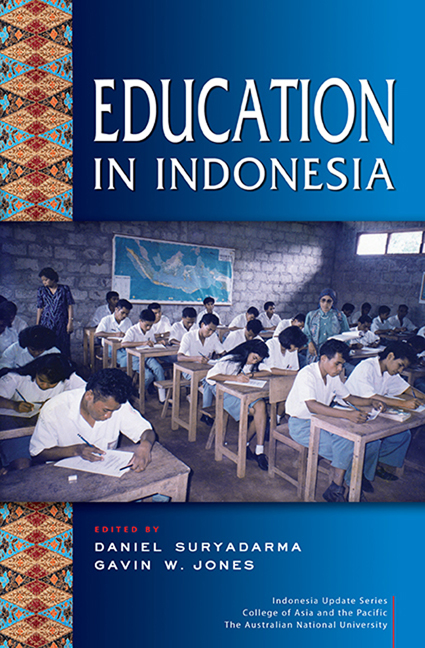Book contents
- Frontmatter
- Contents
- Tables
- Figures
- Contributors
- Acknowledgments
- Glossary
- 1 Meeting the Education Challenge
- 2 Trends in Education in Indonesia
- 3 Teacher Training, School Norms and Teacher Effectiveness in Indonesia
- 4 Integrating Islamic Schools into the Indonesian National Education System: A Case of Architecture over Implementation?
- 5 Early Childhood Education and Development Services in Indonesia
- 6 Where Did All the Money Go? Financing Basic Education in Indonesia
- 7 An Assessment of Policies to Improve Teacher Quality and Reduce Teacher Absenteeism
- 8 Indonesian Universities: Rapid Growth, Major Challenges
- 9 Beating the Odds: Locally Relevant Alternatives to World-class Universities
- 10 Financing Higher Education: The Viability of a Commercial Student Loan Scheme in Indonesia
- 11 The Transformation and Internationalization of Higher Education: The Malaysian Experience
- 12 Role of the Education and Training Sector in Addressing Skill Mismatch in Indonesia
- Index
- Indonesia Update Series
4 - Integrating Islamic Schools into the Indonesian National Education System: A Case of Architecture over Implementation?
Published online by Cambridge University Press: 21 October 2015
- Frontmatter
- Contents
- Tables
- Figures
- Contributors
- Acknowledgments
- Glossary
- 1 Meeting the Education Challenge
- 2 Trends in Education in Indonesia
- 3 Teacher Training, School Norms and Teacher Effectiveness in Indonesia
- 4 Integrating Islamic Schools into the Indonesian National Education System: A Case of Architecture over Implementation?
- 5 Early Childhood Education and Development Services in Indonesia
- 6 Where Did All the Money Go? Financing Basic Education in Indonesia
- 7 An Assessment of Policies to Improve Teacher Quality and Reduce Teacher Absenteeism
- 8 Indonesian Universities: Rapid Growth, Major Challenges
- 9 Beating the Odds: Locally Relevant Alternatives to World-class Universities
- 10 Financing Higher Education: The Viability of a Commercial Student Loan Scheme in Indonesia
- 11 The Transformation and Internationalization of Higher Education: The Malaysian Experience
- 12 Role of the Education and Training Sector in Addressing Skill Mismatch in Indonesia
- Index
- Indonesia Update Series
Summary
INTRODUCTION
Indonesia's education system is the fourth largest in the world. Although data on the exact number of Islamic schools (madrasah) in the country differ, the Ministry of Religious Affairs claimed to manage about 45,000 in 2010. More than 90 per cent of these were private schools, many of them set up by local communities or major Islamic civil society foundations in the absence of state-sponsored alternatives. Although there are important exceptions, the majority of private madrasah have a lower income base, fewer resources and poorer facilities than the state-funded schools, and thus deliver a significantly lower standard of education. They are disproportionately represented in remote or disadvantaged areas and generally have higher proportions of poor students and girls than their state school equivalents. Private madrasah, funded primarily by their communities, deliver the mandatory nine years of basic education to around 6 million students: 3.5 million in 22,000 Islamic primary schools (madrasah ibtidayah) and 2.5 million in 14,000 Islamic junior secondary schools (madrasah tsanawiyah).
Two national ministries are responsible for education: the Ministry of Education and Culture, which has overall responsibility for the public schools; and the Ministry of Religious Affairs, which operates the faith-based schools. The two systems run parallel to each other; they both teach a core curriculum of general subjects, supplemented in the case of the Islamic schools by an additional 30 per cent or so of religious education subjects. This means in practice that few Islamic schools have the capacity to teach the full curriculum of general subjects, although some cope with the additional load by teaching religious subjects in afternoon sessions outside school hours.
The duration of schooling is the same for both the public and faith-based school systems; they offer six years of primary education, three years of junior secondary education and three years of senior secondary education. However, the graduation certificates issued by unaccredited madrasah are not recognized as a qualification for continuing education, and madrasah student participation in external national examinations is not automatic. To some extent, these deficiencies have been addressed by the establishment in 2007 of a national board (BAN-S/M) providing uniform standards of accreditation for all schools.
- Type
- Chapter
- Information
- Education in Indonesia , pp. 68 - 81Publisher: ISEAS–Yusof Ishak InstitutePrint publication year: 2013

